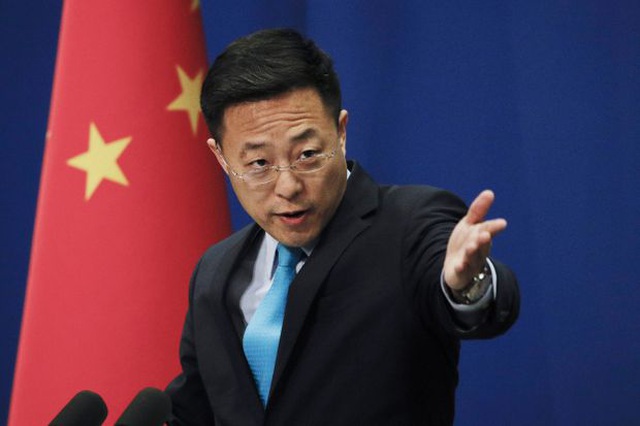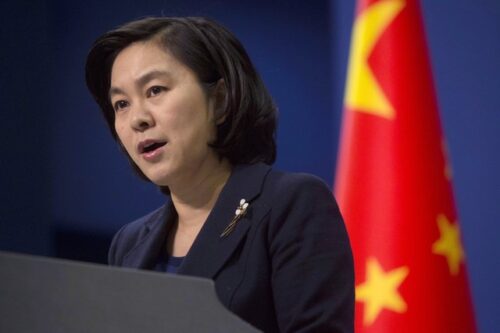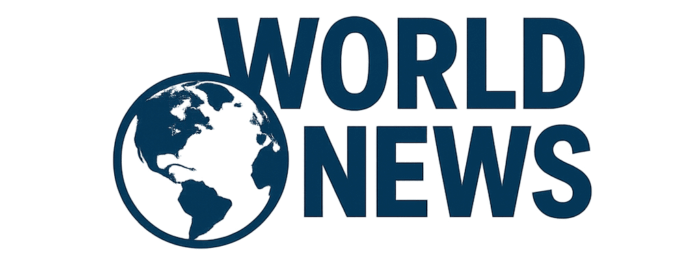China’s “wolf warrior” diplomats are back after a brief period of silence, amid Western pressure on Beijing.

China’s “wolf warrior” diplomats have been back in action in recent months after Beijing faced Western criticism over its treatment of the Uighurs in Xinjiang.
The origins of “Wolf Warrior”
“Wolf Warrior diplomacy” became a popular term in 2019, when Chinese diplomats – most notably Foreign Ministry spokesman Zhao Lijian – spoke out strongly in defense of China on social media platforms like Twitter, which are blocked in China.
According to SCMP, “Wolf Warrior” is actually the name of a series of blockbuster patriotic action films in China, featuring characters with the mission of fighting enemies both at home and abroad to protect China’s interests. The first film was released in 2015 and grossed more than $76 million at the box office.
The film spawned a sequel and became the highest-grossing film in China when it premiered in 2017. “Wolf Warrior 2” centers on a team of soldiers from the People’s Liberation Army who are sent to an African country to rescue Chinese citizens. The message throughout the film is that “anyone who opposes China will pay the price, no matter how far away.”
China says it was forced to change its tone as the administration of former US President Donald Trump also took a tough line on Beijing.
However, Chinese diplomats like Zhao Lijian, who made headlines in 2019 with controversial tweets while serving in Pakistan, took on a new “fighting” role as foreign ministry spokesman just a year later.
Mr Zhao promoted conspiracy theories including the allegation that the US military may have brought Covid-19 to China, and later criticised Australia in tweets accusing “Australian soldiers of killing Afghan civilians and prisoners”.
Mr Zhao’s post, which was accompanied by an illustration of a soldier holding a bloody knife to a child’s neck, was criticised by the Australian prime minister, straining bilateral relations.
Mr Trump’s “Chinese virus” claims have angered Beijing’s diplomats as the pandemic has spread around the world.
Experts say China’s shift to “offensive” diplomacy is part of an increasingly assertive China under President Xi Jinping.
The return of the wolf warrior diplomacy

When Joe Biden took office as US President in January, Chinese diplomats held out hope of a reset in bilateral relations.
However, the “ceasefire” appeared to collapse at a US-China meeting in Anchorage, Alaska, in mid-March, when China’s top diplomat Yang Jiechi warned of action in response to “US interference”.
“Yang Jiechi’s tough remarks in Anchorage seem to have emboldened senior Chinese diplomats to make more aggressive statements,” said Dr. Mathieu Duchatel, director of the Asia Program at the Paris-based Institut Montaigne.
After Yang Jiechi’s meeting with US officials, Li Yang, China’s consul general in Rio de Janeiro, Brazil, called Canadian Prime Minister Justin Trudeau a “little boy”, while calling Canada a “puppy chasing the US”.
In late March, when the European Union, Britain, Canada and the United States imposed sanctions on China over Xinjiang, Chinese Foreign Ministry spokeswoman Hua Chunying even suggested that the CIA was fabricating stories about Xinjiang to destabilize China.
In response to international brands like H&M and Nike expressing concerns about forced labor of Uyghurs in the cotton supply chain in Xinjiang, Hua Chunying showed a photo of what she said was a black slave in a cotton field in the United States. Referring to the transatlantic slave trade, Hua said other countries were in no position to criticize China.
Chinese diplomats say the country is forced to retaliate when its rivals – especially Western countries – “collude” to contain Beijing’s rise.
According to AFP, the tone of Chinese diplomats has changed markedly under President Xi Jinping, compared to the philosophy of the late leader Deng Xiaoping to “hide and bide”.
When France recently summoned the Chinese ambassador over “unacceptable” behavior, the Chinese embassy said the diplomat would not immediately comply, but would instead come to present the sanctions and the Taiwan issue.
“The instability of the international environment also gives Beijing a space to develop a strategy to challenge the existing international order,” said Dr Zhao Alexandre Huang, a scholar at the Gustave Eiffel University in France.
According to Dr Chong Ja Ian at the National University of Singapore, China’s show of force and threats of retaliation can lead to tensions in relations with countries, but this tactic can also make other countries nervous.
Countries that rely on Chinese trade are “more vulnerable” to Beijing, Chong said. Meanwhile, those that have experience dealing with Chinese pressure may have an easier time quelling Beijing’s anger.
However, the diplomatic battle on social media has not always been “smooth sailing” for China. In September 2020, the Twitter account of Chinese Ambassador to the UK Liu Xiaoming “liked” a video posted by a pornographic website. Liu said his account had been hacked. He retired a few months later.
Thanh Dat
Summary

